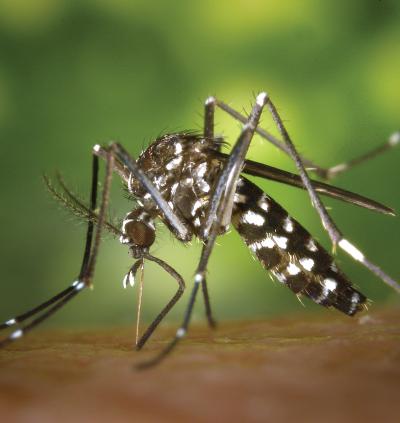Larger mosquitoes better at transmitting disease, put residents at risk

Credit: CDC
(Millbrook, NY) Low-income urban neighborhoods not only have more mosquitoes, but they are larger-bodied, indicating that they could be more efficient at transmitting diseases. So reports a Cary Institute of Ecosystem Studies-led study, published in the Journal of Medical Entomology, investigating how socioeconomics influences mosquito-borne disease risk in Baltimore, Maryland.
As part of the Baltimore Ecosystem Study, Cary Institute scientists have been investigating how environmental and social conditions regulate mosquito numbers. Tiger mosquitoes (Aedes albopictus) were the focus of this study. This invasive species dominates in urban areas, where it is an aggressive day-biter that targets people and can transmit an array of viruses including dengue fever, Zika, chikungunya, Eastern Equine Encephalitis, and West Nile virus.
Cary Institute disease ecologist Shannon LaDeau, senior author on the study, explains, “More people are living in cities. At the same time, many other species are also adapting to city living. Invasive species like the tiger mosquito increasingly thrive in temperate urban areas, living among us and fundamentally altering the risk of local disease emergence. “
Previous studies have found that wing length is an accurate proxy for body size in mosquitoes, and body size influences traits that are important to disease transmission. LaDeau and colleagues measured wing length of tiger mosquitoes trapped across a continuum of neighborhoods in Baltimore, Maryland. Results where clear: mosquitoes from less affluent blocks were larger than mosquitoes from more affluent blocks.
Block-to-block differences in abandoned buildings, vacant lots, and trash removal influence mosquito populations, biting patterns, and disease risk. LaDeau explains, “People living in neighborhoods with abandoned infrastructure are more at risk, because tiger mosquitoes flourish in less managed landscapes. They can breed in the water filling a bottle cap or crushed can. Abundant juvenile habitat sets the stage for healthy adult mosquitoes.”
Adult female tiger mosquitoes were collected from 13 residential blocks in Baltimore over the course of three summers. Trapping took place in June and July, 2015-2017. Blocks were distributed among five neighborhoods ranging in socioeconomic status – with varying levels of management and occupancy.
For each block, the team measured the percentage of abandoned structures and counted discarded container habitats – defined as any object that could potentially hold water – to determine whether differences in these features across blocks influenced numbers of juvenile tiger mosquitoes and adult female body size.
Over the three years of the study, 1097 mosquitoes were collected and measured. The team found that mosquitoes from blocks with higher abandonment had larger wings than those collected on more affluent blocks with less abandonment. Wing length differences of less than one millimeter can affect traits like fecundity, longevity, and ability to spread disease.
They also counted juvenile tiger mosquitos and related these numbers to the abundance of unmanaged container habitats in a block. Less affluent blocks averaged 400 habitats per square kilometer with 80% containing mosquito larvae. More affluent blocks averaged only 50 containers per square kilometer with less than 5% containing mosquito larvae.
Lead author Grace Katz worked on the project as a high school intern and was responsible for measuring hundreds of wings. She explains, “Understanding how landscape features influence mosquito size and their ability to make us sick is important if we want to better manage mosquitoes in cities.”
LaDeau concludes, “The trends we’re seeing in mosquito numbers and body size map onto socioeconomic patterns at the block-level. There are environmental justice and equity implications at play. Residents of less affluent neighborhoods are exposed to more mosquitoes. If those mosquitoes have greater longevity or fitness, as previous studies on body size suggest, then residents may be at a greater risk of contracting mosquito-borne illnesses. There’s a pressing need to address infrastructure abandonment and waste management to protect all residents.”
###
Read the full study: academic.oup.com/jme/article/doi/10.1093/jme/tjz170/5575655/
*Mosquito samples used for this study were collected with the financial support of the National Science Foundation Baltimore Ecosystem Study (NSF-LTER DEB 1027188) and the NSF Coupled Natural Human Systems Program (DEB 1211797).
Investigators:
Grace Katz – Cary Institute of Ecosystem Studies, Spackenkill High School
Paul T. Leisnham – University of Maryland, College Park, Department of Environmental Science and Technology
Shannon L. LaDeau – Cary Institute of Ecosystem Studies
Cary Institute of Ecosystem Studies is an independent nonprofit center for environmental research. Since 1983, our scientists have been investigating the complex interactions that govern the natural world and the impacts of climate change on these systems. Our findings lead to more effective management and policy actions and increased environmental literacy. Staff are global experts in the ecology of: cities, disease, forests, and freshwater.
Media Contact
Lori M Quillen
[email protected]
845-677-7600 x121




